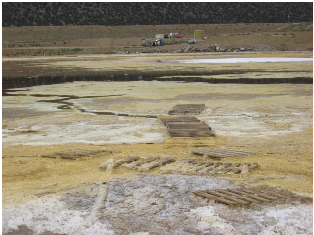The O. Zone
Company whose parent firm make Predator Drones wants to stop uranium testing because of wooden pallets
Rather than seek an appropriate technological solution, managers of a decommissioned uranium processing mill near Cañon City want the state to let them stop testing a radioactive holding pond because wooden pallets used to cross the pond are sinking into the toxic mud.
Environmental attorneys and watchdog citizen groups point out that the company that owns the U.S. Environmental Protection Agency Superfund Cleanup site that's been leaking into local groundwater since the 1950s is Cotter Corp., a subsidiary of General Atomics, which is a division of General Dynamics – the company that makes high-tech Predator Drones.
As the Denver Post first reported earlier this month, Cotter officials have asked (pdf) the Colorado Department of Public Health and Environment to allow them to stop testing the pond for acidity. Cotter is in the process of dismantling the old mill, although at one point recently the company was considering re-starting operations there. Now the facility is the subject of ongoing litigation.
“The attached photos will indicate the problems getting to and the distance from the water,” a CDPHE official wrote in a July 21 report (pdf) on the situation. “Personnel have used pallets to provide a stable walking and work platform but the pallets are now at least two deep and continue to sink into the mud. It is my opinion that accessing the ponds edge is no longer safe.
“With the pallets continuing to sink and the stability of the ground it is recommended that personnel discontinue the practice of taking pH measurements in the Primary Impoundment.”
Travis Stills, an attorney with the Durango-based Energy Minerals Law Center, points out that these are the same state regulators who will oversee the proposed new Piñon Ridge Uranium Mill that the Canadian company, Energy Fuels, wants to build in western Montrose County.
“Basically, the judgment of the nuclear fuels industry and its captive regulators in Colorado is not to be trusted when it comes to matters of health, safety, and a clean environment,” Stills said in an email. “[Coloradans Against ToxicWaste], without the benefit of attorneys, examined Cotter in 2005 to establish the importance of monitoring and maintaining pH levels to stabilize the tailings and prevent further deterioration of the liners.”
![]() 0 Comments on "Company whose parent firm make Predator Drones wants to stop uranium testing because of wooden pallets"
0 Comments on "Company whose parent firm make Predator Drones wants to stop uranium testing because of wooden pallets"
Be the first to comment below.



 Vail Town Council to weigh new plan to redevelop T...
Vail Town Council to weigh new plan to redevelop T...  All about indexes
All about indexes  Transforming your social security into a winning r...
Transforming your social security into a winning r...  Pass sales, real estate transactions, revenues inc...
Pass sales, real estate transactions, revenues inc...  Vail Valley native with passion for Biophilic inte...
Vail Valley native with passion for Biophilic inte...  Beaver Creek starts work on new summer activities
Beaver Creek starts work on new summer activities  Land Trust, ECO Trails, Vail Resorts team up to cl...
Land Trust, ECO Trails, Vail Resorts team up to cl...  EUROVISION named Host Broadcaster for 2015 World A...
EUROVISION named Host Broadcaster for 2015 World A...  Vail Resorts brings back Lindsey Vonn's 'School of...
Vail Resorts brings back Lindsey Vonn's 'School of...  Hundreds turn out for 2015 World Championships vol...
Hundreds turn out for 2015 World Championships vol...  Eagle County Senior Health Expo and 9th Annual Hea...
Eagle County Senior Health Expo and 9th Annual Hea...  Final race of Vail Mountain Trail Running Series s...
Final race of Vail Mountain Trail Running Series s...  Before you write your will ...
Before you write your will ...  2015 World Ski Championships volunteer recruitment...
2015 World Ski Championships volunteer recruitment...  Ascent Sotheby’s International Realty in Vail an...
Ascent Sotheby’s International Realty in Vail an...  CDOT outlines road closures for local stages of US...
CDOT outlines road closures for local stages of US...  Italian artist creates unique trophies for Vail, B...
Italian artist creates unique trophies for Vail, B...  Vail Recreation District once again hosting Jake W...
Vail Recreation District once again hosting Jake W... 

